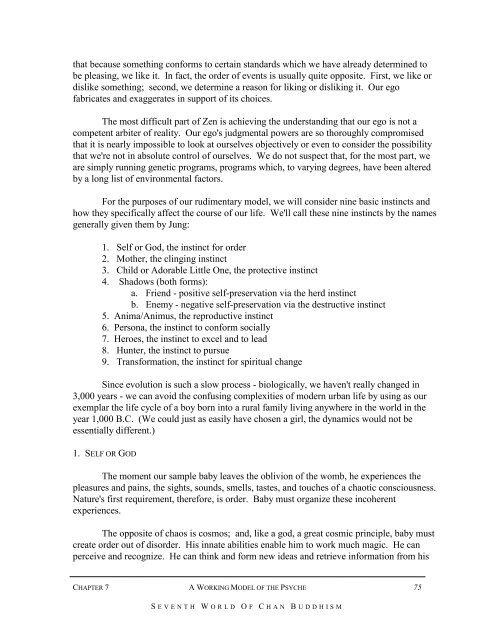seventh world of chan buddhism - Zen Buddhist Order of Hsu Yun
seventh world of chan buddhism - Zen Buddhist Order of Hsu Yun
seventh world of chan buddhism - Zen Buddhist Order of Hsu Yun
Create successful ePaper yourself
Turn your PDF publications into a flip-book with our unique Google optimized e-Paper software.
that because something conforms to certain standards which we have already determined to<br />
be pleasing, we like it. In fact, the order <strong>of</strong> events is usually quite opposite. First, we like or<br />
dislike something; second, we determine a reason for liking or disliking it. Our ego<br />
fabricates and exaggerates in support <strong>of</strong> its choices.<br />
The most difficult part <strong>of</strong> <strong>Zen</strong> is achieving the understanding that our ego is not a<br />
competent arbiter <strong>of</strong> reality. Our ego's judgmental powers are so thoroughly compromised<br />
that it is nearly impossible to look at ourselves objectively or even to consider the possibility<br />
that we're not in absolute control <strong>of</strong> ourselves. We do not suspect that, for the most part, we<br />
are simply running genetic programs, programs which, to varying degrees, have been altered<br />
by a long list <strong>of</strong> environmental factors.<br />
For the purposes <strong>of</strong> our rudimentary model, we will consider nine basic instincts and<br />
how they specifically affect the course <strong>of</strong> our life. We'll call these nine instincts by the names<br />
generally given them by Jung:<br />
1. Self or God, the instinct for order<br />
2. Mother, the clinging instinct<br />
3. Child or Adorable Little One, the protective instinct<br />
4. Shadows (both forms):<br />
a. Friend - positive self-preservation via the herd instinct<br />
b. Enemy - negative self-preservation via the destructive instinct<br />
5. Anima/Animus, the reproductive instinct<br />
6. Persona, the instinct to conform socially<br />
7. Heroes, the instinct to excel and to lead<br />
8. Hunter, the instinct to pursue<br />
9. Transformation, the instinct for spiritual <strong>chan</strong>ge<br />
Since evolution is such a slow process - biologically, we haven't really <strong>chan</strong>ged in<br />
3,000 years - we can avoid the confusing complexities <strong>of</strong> modern urban life by using as our<br />
exemplar the life cycle <strong>of</strong> a boy born into a rural family living anywhere in the <strong>world</strong> in the<br />
year 1,000 B.C. (We could just as easily have chosen a girl, the dynamics would not be<br />
essentially different.)<br />
1. SELF OR GOD<br />
The moment our sample baby leaves the oblivion <strong>of</strong> the womb, he experiences the<br />
pleasures and pains, the sights, sounds, smells, tastes, and touches <strong>of</strong> a chaotic consciousness.<br />
Nature's first requirement, therefore, is order. Baby must organize these incoherent<br />
experiences.<br />
The opposite <strong>of</strong> chaos is cosmos; and, like a god, a great cosmic principle, baby must<br />
create order out <strong>of</strong> disorder. His innate abilities enable him to work much magic. He can<br />
perceive and recognize. He can think and form new ideas and retrieve information from his<br />
CHAPTER 7 A WORKING MODEL OF THE PSYCHE<br />
S EVENTH W ORLD O F C HAN B UDDHISM<br />
75


